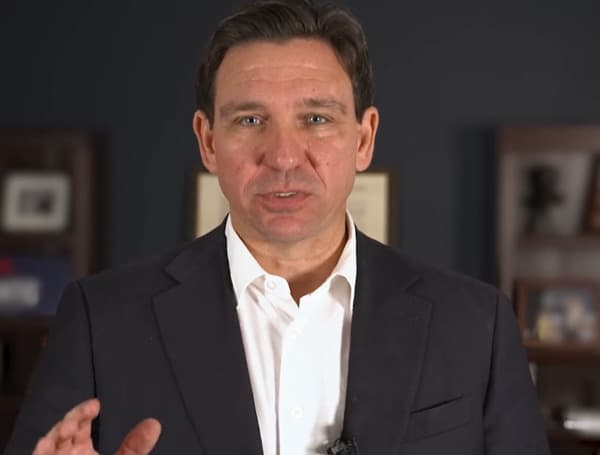As the world continues to grapple with the aftermath of the COVID-19 pandemic, the World Health Organization (WHO) has proposed a new “Pandemic Agreement” aimed at enhancing global preparedness for future health emergencies.
However, a coalition of Republican governors from two dozen states has risen in opposition, arguing that this potential treaty could undermine national sovereignty and infringe on the rights of individual states.
Florida Governor Ron DeSantis signed the opposition.
Read: Florida Gov. DeSantis Wipes Out ‘Climate Change’ Language But Focuses On Reliable Energy
The proposed WHO Pandemic Agreement, which member nations will discuss on May 27th, has sparked a fierce debate over the balance between international cooperation and preserving domestic autonomy.
The governors, in a strongly worded letter to President Joe Biden, have vowed to resist any attempts by the WHO to assert authority over public health policies affecting their citizens.
The opposition to the Pandemic Agreement has gained traction at the grassroots level, as evidenced by the recent Republican primary election in Georgia. In a nonbinding vote, 93.3% of Georgia GOP voters expressed their opposition to “unelected and unaccountable international bureaucrats,” such as those at the WHO, having “complete control over the management of future pandemics in the United States and authority to regulate your healthcare and personal health choices.”
While the vote is not legally binding, it could influence the legislative actions of Georgia lawmakers when they reconvene next year. This sentiment is likely to resonate with Republican voters in other states, potentially shaping the political landscape and the future of the Pandemic Agreement negotiations.
Read: Alaska, Florida, And Texas Among Those Leading The Pack In Upward State Tax Revenue Trends
The proposed Pandemic Agreement is still in the discussion phase, and member states can decide to delay the vote until later this year. The final form of the agreement, whether it becomes a treaty, regulation, or resolution, will have significant implications for its enforceability and the level of influence the WHO can exert over participating nations.
If a treaty is ultimately adopted, the United States Senate would still need to ratify it domestically, providing an additional layer of scrutiny and potential resistance. The governors’ letter suggests that they are prepared to continue their opposition, potentially challenging the federal government’s ability to commit the country to the Pandemic Agreement without their consent.
At the heart of the governors’ objections is the principle of state sovereignty. They argue that public health policy is a matter reserved for the states, not the federal government or international bodies like the WHO. This stance reflects a broader ongoing debate about the balance of power between the states and the federal government, particularly in the realm of public health and individual liberties.
The governors contend that the Pandemic Agreement could undermine this delicate balance, potentially eroding the states’ ability to make autonomous decisions regarding the health and well-being of their citizens. This concern is likely to resonate with a significant portion of the American electorate, especially those who prioritize the preservation of state-level autonomy.
Read: Florida Rep. Matt Gaetz Advocates For Abolishing ATF After Biden’s Most Recent Attempted Gun Grab
The governors’ opposition to the Pandemic Agreement also raises the specter of potential international tensions. While the United States has previously withdrawn from the WHO under the Trump administration, the Biden administration has since reversed that decision. The current standoff between the Republican-led states and the federal government could complicate the United States’ diplomatic relations with the WHO and its member nations.
The debate surrounding the Pandemic Agreement extends beyond the immediate concerns of state sovereignty and individual liberties. It also touches on the broader question of how the global community can best prepare for and respond to future health emergencies.
The governors’ objections to the treaty suggest a fundamental disagreement with the WHO’s vision for a more coordinated and equitable international approach to pandemic management. They argue that the Pandemic Agreement could undermine the autonomy of states to tailor their responses to the unique needs and preferences of their citizens.
Read: Florida Sen. Rick Scott Rips Senate Dems Seeking To Make “Toxic Open Border Policies” Into Law
However, proponents of the treaty counter that enhanced global cooperation and the standardization of pandemic protocols are essential to ensuring a more effective and equitable response to future health crises. This tension between national sovereignty and international coordination will likely continue to be a central point of contention in the ongoing discussions surrounding the Pandemic Agreement.
The letter signed by the 24 Republican governors, addressed to President Biden, serves as a unified front against the Pandemic Agreement. The signatories include:
- Kay Ivey of Alabama
- Mike Dunleavy of Alaska
- Sarah Sanders of Arkansas
- Ron DeSantis of Florida
- Brian Kemp of Georgia
- Brad Little of Idaho
- Eric Holcomb of Indiana
- Kim Reynolds of Iowa
- Jeff Landry of Louisiana
- Tate Reeves of Mississippi
- Greg Gianforte of Montana
- Jim Pillen of Nebraska
- Joe Lombardo of Nevada
- Chris Sununu of New Hampshire
- Doug Burgum of North Dakota
- Kevin Stitt of Oklahoma
- Henry McMaster of South Carolina
- Kristi Noem of South Dakota
- Bill Lee of Tennessee
- Greg Abbott of Texas
- Spencer Cox of Utah
- Glenn Youngkin of Virginia
- Jim Justice of West Virginia
- Mark Gordon of Wyoming
This bipartisan group of state executives has firmly stated their commitment to resisting any attempts by the WHO to assert authority over public health policies affecting their citizens.
Help support the Tampa Free Press by making any small donation by clicking here.
Android Users, Click To Download The Tampa Free Press App And Never Miss A Story. Follow Us On Facebook and Twitter. Sign up for our free newsletter.



